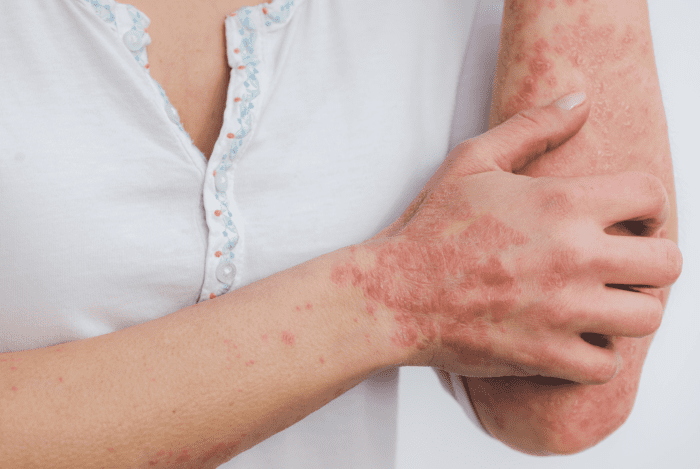Unmasking Psoriasis: Understanding the Skin Condition Affecting Millions

Did you know that over 8 million Americans suffer from psoriasis, a chronic skin condition that affects their daily lives in various ways? According to the National Psoriasis Foundation, this condition, characterized by red, scaly patches on the skin, impacts around 2-3% of the global population. If you or someone you know is struggling with psoriasis, understanding its causes, symptoms, and treatments can make a world of difference. Let’s dive into the essentials of psoriasis and how to manage it effectively.
What is Psoriasis?
Psoriasis is a chronic autoimmune condition that speeds up the life cycle of skin cells. This accelerated process causes cells to build up rapidly on the skin’s surface, forming scales and red patches that can be itchy and sometimes painful. Unlike other skin conditions, psoriasis is not just a cosmetic issue but a systemic disorder that can significantly affect one's quality of life.
Causes of Psoriasis
The exact cause of psoriasis remains unclear, but it is believed to be a combination of genetic and environmental factors. Here are some key contributors:
- Genetics:
Psoriasis tends to run in families, indicating a hereditary component.
- Immune System:
An overactive immune system mistakenly attacks healthy skin cells, leading to rapid skin cell production.
- Triggers:
Stress, infections, skin injuries, and certain medications can trigger or exacerbate the condition.
Early Symptoms of Psoriasis
Psoriasis manifests in various forms, but early symptoms include:
- Red patches of skin covered with thick, silvery scales.
- Dry, cracked skin that may bleed.
- Itching, burning, or soreness around patches.
- Thickened or ridged nails.
- Swollen and stiff joints (psoriatic arthritis).

Treatment of Psoriasis
While there is no cure for psoriasis, several treatments can help manage the symptoms and improve quality of life:
Systemic Medications for Psoriasis
Biologics
Biologics are a newer class of systemic medications that target specific components of the immune system. They are derived from living cells and are typically administered via injection or infusion.
- TNF-alpha Inhibitors:
These include Cimzia (Certolizumab Pegol), Etanercept (Enbrel), Infliximab (Remicade), and Adalimumab (Humira). They work by blocking tumor necrosis factor-alpha (TNF-alpha), a cytokine that plays a crucial role in inflammation. These medications are effective for both psoriasis and psoriatic arthritis, providing significant skin clearance and joint pain relief.
- IL-12/23 Inhibitors:
Ustekinumab (Stelara) targets interleukin-12 and interleukin-23, cytokines involved in the inflammatory process. It is administered via injection and has been shown to be highly effective for both plaque psoriasis and psoriatic arthritis.
- IL-17 Inhibitors:
Medications like Secukinumab (Cosentyx) and Ixekizumab (Taltz) inhibit interleukin-17, another key player in the inflammatory response. These biologics are particularly effective for moderate to severe plaque psoriasis, offering rapid and sustained skin clearance.
- IL-23 Inhibitors:
Guselkumab (Tremfya) and Risankizumab (Skyrizi) specifically target interleukin-23. These biologics have shown impressive efficacy in clinical trials, with many patients achieving significant skin improvement.
- IL-36 Inhibitors Pathway Inhibitors:
These represent a promising new class of treatments targeting the interleukin-36 pathway, which is implicated in the inflammatory process of pustular psoriasis. Spevigo (Spesolimab-Sbzo) is an example.
- T-Cell Inhibitors:
Orencia (abatacept) targets T-cells, a type of white blood cell involved in the inflammation associated with psoriatic disease. By inhibiting T-cell activation, Orencia helps reduce the inflammatory response, offering relief for patients with psoriatic arthritis.
Newer Oral Treatments
Advances in oral systemic medications offer new options for patients who prefer or require alternatives to biologics.
- RINVOQ (upadacitinib):
This medication targets Janus kinase (JAK) pathways to modulate the immune response associated with psoriatic arthritis. Approved for adults with active psoriatic arthritis who have not responded adequately to TNF inhibitors, RINVOQ helps reduce inflammation and improve symptoms.
- Sotyktu (deucravacitinib):
An oral medication that selectively inhibits tyrosine kinase 2 (TYK2), a member of the JAK family, Sotyktu is approved for adults with moderate-to-severe plaque psoriasis who are candidates for systemic therapy or phototherapy. It works by targeting specific pathways in the immune system to reduce inflammation.
- Apremilast (Otezla):
Apremilast is an oral phosphodiesterase 4 (PDE4) inhibitor that helps reduce inflammation. It is particularly useful for patients with moderate to severe psoriasis who prefer an oral medication. Common side effects include gastrointestinal issues and weight loss.
- Tofacitinib (Xeljanz):
Although not yet approved for psoriasis, Tofacitinib is a Janus kinase (JAK) inhibitor used in the treatment of psoriatic arthritis. It works by interfering with the signaling pathways that contribute to inflammation. Early studies suggest it could be a promising option for psoriasis as well.
Lifestyle Changes
In addition to medical treatments, lifestyle modifications can help manage psoriasis.
- Diet: A balanced diet rich in anti-inflammatory foods, such as fruits, vegetables, and omega-3 fatty acids, can help reduce flare-ups.
- Stress Management: Techniques such as yoga, meditation, and deep breathing exercises can lower stress levels and improve symptoms.
- Skin Care: Using gentle skin care products, keeping the skin moisturized, and avoiding harsh soaps can prevent irritation and worsening of symptoms.
Living with Psoriasis
Living with psoriasis involves more than just medical treatment; it requires a holistic approach:
- Skincare Routine: Keeping the skin moisturized and avoiding harsh skin products can prevent irritation.
- Mental Health: Support groups, counseling, and stress management techniques can be beneficial.
- Education and Advocacy: Learning about the condition and educating others can reduce stigma and promote better understanding.
Understanding psoriasis is the first step toward managing it effectively. With the right combination of treatments, lifestyle changes, and support, individuals with psoriasis can lead fulfilling lives despite the challenges posed by this condition.
FirstChoice Rheumatology: Your Partner in Psoriasis Care
At FirstChoice Rheumatology, we specialize in treating a wide range of rheumatic diseases, including psoriasis. Our team of experienced rheumatologists is dedicated to providing personalized care tailored to each patient’s unique needs. From advanced diagnostic services to innovative treatment options, we are committed to improving the lives of those living with chronic conditions. Whether you are dealing with psoriasis or another rheumatic disease, we are here to support you every step of the way. Contact us today!
FAQs
What is the main cause of Psoriasis?
The main cause of psoriasis is a combination of genetic predisposition and an overactive immune system, which leads to the rapid production of skin cells. Environmental triggers such as stress, infections, and certain medications can also exacerbate the condition.
Is Psoriasis contagious?
No, psoriasis is not contagious. It is an autoimmune condition that cannot be spread from person to person through touch or any other means.
About Dr. Shalene Badhan

When it comes to managing rheumatologic conditions, empathy is as crucial as expertise. Dr. Shalene Badhan, our lead Rheumatologist and an Internal Medicine specialist, embodies both. Having been diagnosed with psoriasis and psoriatic arthritis herself, Dr. Badhan brings a unique perspective to her practice, combining professional excellence with personal insight. Her journey through diagnosis, treatment, and daily management of autoimmune diseases allows her to connect with her patients on a profound level, offering not just medical advice but also understanding and solidarity.

